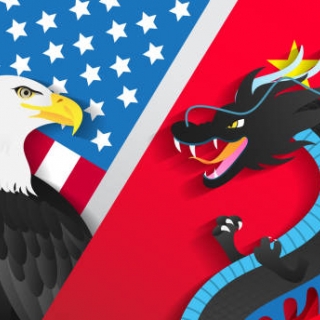


Tencent and Baidu, two of China's largest technology companies, revealed how they're keeping in the global artificial intelligence race even as the U.S. tightens some curbs on key semiconductors.
The business' methods include stockpiling chips, making AI models more efficient and even using homegrown semiconductors.
While the administration of U.S. President Donald Trump scrapped one controversial Biden-era chip rule, it still tightened exports of some semiconductors from companies including Nvidia
and AMD in April.
Big names in the sector addressed the issue during their latest earnings conference calls.
Martin Lau, president of Tencent the operator of China's biggest messaging app WeChat said his company has a "pretty strong stockpile" of chips that it has previously purchased. He was referring to graphics processing units (GPUs), a type of semiconductor that has become the gold standard for training huge AI models.
These models require powerful computing power supplied by GPUs to process high volumes of data.
But, Lau said, contrary to American companies' belief that GPU clusters need to expand to create more advanced AI, Tencent is able to achieve good training results with a smaller group of such chips.
"That actually sort of helped us to look at our existing inventory of high-end chips and say, we should have enough high-end chips to continue our training of models for a few more generations going forward," Lau said.
Source: CNBC
Federal Reserve Chair Jerome Powell on Thursday responded to a Trump administration official's demands for information about cost overruns for a renovation project at the central bank's Washington hea...
The United States Commerce Department is set to impose preliminary anti-dumping duties of 93.5% on graphite imported from China after concluding the materials, which are a key component for batteries,...
U.S. President Donald Trump's decision to ramp up arms shipments to Ukraine is a signal to Kyiv to abandon peace efforts, Russia said on Thursday, vowing it would not accept the "blackmail" of Washing...
Federal Reserve Governor Adriana Kugler said the US central bank should keep interest rates steady "for some time," citing accelerating inflation as tariffs begin to push up prices. "Given the stabil...
Unemployment claims fell 7,000 to 221,000 in the week ending July 12, compared with the median estimate of 233,000, according to Labor Department data. The estimated range was 220,000-240,000 accordi...
The Hang Seng Index surged 327 points, or 1.3%, to close at 24,825 on Friday (July 18th), reversing two days of declines as all sectors rallied. The index hit a four-month high and rose 2.8% for the week, marking its second consecutive weekly...
The STOXX 50 gained 0.4% and the STOXX 600 rose 0.3% on Friday, as investors closely monitored corporate earnings and news, while staying on edge for any signs of progress in trade negotiations between the US and the European Union. Reckitt...
The Nikkei 225 fell 0.2% to close at 39,819 on Friday, while the broader Topix also declined 0.2% to 2,834, erasing early gains from the morning session. The Nikkei reversed a modest gain from the previous day in choppy trading, as investors stayed...
 U.S. consumer prices increased by the most in five months in June amid higher costs for some goods, suggesting tariffs were starting to have an...
U.S. consumer prices increased by the most in five months in June amid higher costs for some goods, suggesting tariffs were starting to have an...
 European stocks erased early gains and closed mostly lower on Tuesday as markets continued to assess how potential tariffs from the US may hurt...
European stocks erased early gains and closed mostly lower on Tuesday as markets continued to assess how potential tariffs from the US may hurt...
 The U.S. central bank will probably need to leave interest rates where they are for a while longer to ensure inflation stays low in the face of...
The U.S. central bank will probably need to leave interest rates where they are for a while longer to ensure inflation stays low in the face of...
 President Donald Trump's renewed calls for Federal Reserve Chair Jerome Powell's resignation have prompted investors to protect portfolios against...
President Donald Trump's renewed calls for Federal Reserve Chair Jerome Powell's resignation have prompted investors to protect portfolios against...